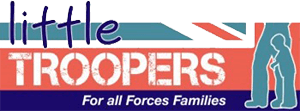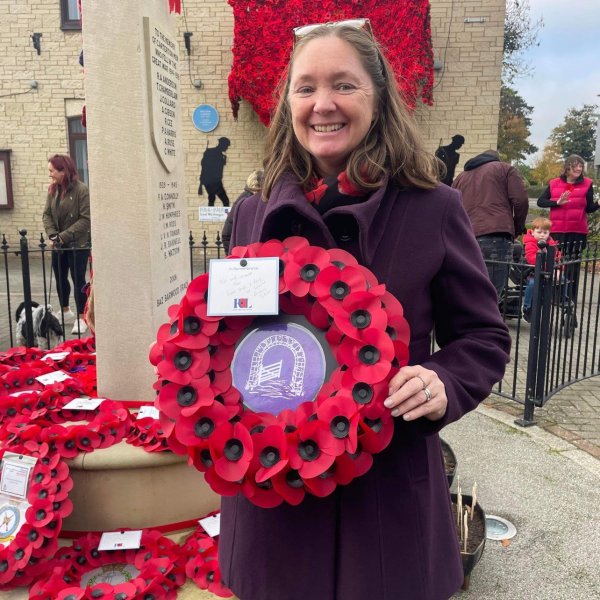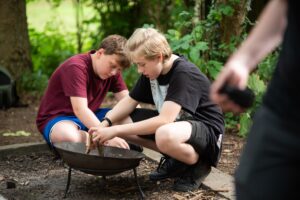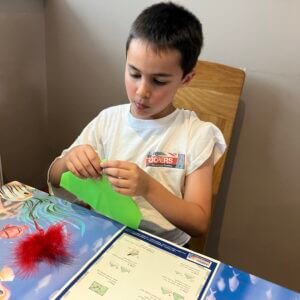Toni Summers, a teaching assistant from Gateway Primary School in Carterton tells us how her school celebrates its military connection and ensures each military child and their family feel welcome at the school.
Tell us about yourself and how you came to be a Family Support Worker?
My name is Toni Summers, I work at Gateway Primary school in Carterton. I started working at the school as a Teaching Assistant and took on the Family Support role in 2018. I really enjoy working with children and their families, no two days are the same. so that each military child and their family feel welcome.
Tell us about yourself and how you came to be a Family Support Worker?
I started working at the school as a Teaching Assistant and took on the Family Support role in 2018. I really enjoy working with children and their families, no two days are the same.
How many military children are there in your school?
Almost 60% of our children are from military families and the number is constantly changing. We currently have 146 service children in our school the majority are connected to the RAF. Our school is right next to RAF Brize Norton so we see the aircraft all the time.
How does your school support forces’ families?
As a school we have tailored our curriculum, behaviour system and houses so they all have a military connection. We have made sure that the military connection is visible and we acknowledge a number of military themed days throughout the year. There is a strong emphasis on belonging, making each child and their family feel welcome and part of our school.
My role is to support each military child as they move in and out of our school then helping them when they settle in. Each child is allocated a ‘Buddy’ and they guide them on their first few days until they find their feet. I liaise with parents in the admissions process to form a relationship before they have joined us.
Do you have a connection to the military? If so, do you think this helps you when interacting with the service pupils?
I am a military dependent and have been since 2004. My husband is in the RAF and I have three children. I have experienced deployments, postings, last minute changes to plans, as well as being ‘weekenders’ so I can use these experiences to help support our families. I think it does help when interacting with service parents as I understand how it feels, I can relate and empathise with their unpredictable way of life.
What initiatives or projects have worked particularly well?
Throughout the year we acknowledge military events and each April – the month of the military child – we give our children the opportunity to share what it is like being a military child. We host two assemblies. The launch assembly is led by representatives from RAF Brize Norton and our local secondary school. We close the month with an assembly that provides a platform for the pupils to express their experiences and feelings in front of their families. All finished off with a cake sale to raise money for Little Troopers.
We run Buddy Club each lunch time in The Hangar, providing an opportunity to meet up with other children with a parent deployed or to share their worries over lunch and a play. I also host Hang at The Hangar each month, a coffee morning open to parents and younger siblings. I also invite members of the RAF Brize Norton Community Support Team, it is a great opportunity to meet new people and talk about any military matters over a cuppa and a cake.
Why do you think it’s important to offer targeted support for military children in school?
It is important to acknowledge that we are all unique and at Gateway we ensure that each family is offered a bespoke approach when supporting them. We have families that like to move all the time and those that have stayed at Brize for their entire career. Some children accept times of separation and some find just one night apart difficult. It is imperative to be present, have a listening ear and to let them express their feelings.
In your experience, what are the biggest challenges faced by military children in school?
Change is the biggest challenge to all of the children at Gateway with deployments, postings and random courses. Our service families often live in times of ‘limbo’ not always sure of what is happening or where they might be going. They are often not close to extended family so are reliant on the friends they make along the way, their military family. For some children they have attended many schools, said many goodbyes and also embraced the hellos. It is also tough on all the families that don’t move on or for our non-military families as they have to say goodbye several times throughout their time with us. However, a positive from the frequent changes is that our children are extremely welcoming and are instrumental in making a difference when anyone joins us.
What’s the one thing you think is most important for schools to do for forces children?
It is important to recognise the sacrifices but also celebrate their strengths. Our children are very resilient and accepting of their life and are also happy to share their experiences. We embrace a whole school approach when supporting the needs of our service families, the children know that they can talk to anyone. Having me as a named person in the school to contact really helps, the parents can inform me of any changes and this is shared with teachers. I then provide support in times of change for the parents and children.
What advice would you offer to other professionals working with military children?
It is important to be compassionate, empathetic and to embrace the positives alongside supporting throughout the challenges. Think of the qualities not just difficulties and put the effort in to help them feel like they belong. It is extremely rewarding and before you know it you are preparing them to move on. I feel privileged to be a pivotal part of their journey and proud of Gateway staff and pupils for everything they do to on a daily basis to make a difference.






